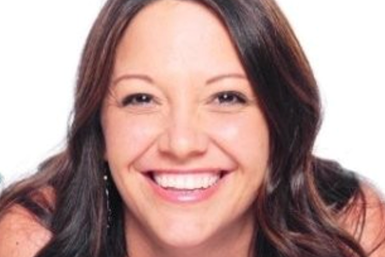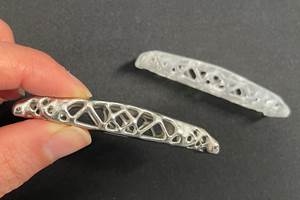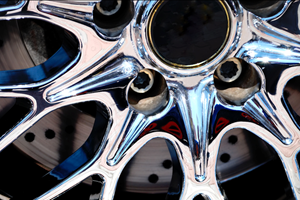Episode 34: An Interview with Chrissy Pullara, Astro Electroplating
From research chemist to chemistry teacher to marketing manager to business development, Astro Electroplating’s new president Chrissy Pullara has already had a prolific career in finishing — she recently sat down with Products Finishing to talk about her experience, trends in the industry and what’s next for her company.

Chrissy Pullara, president, Astro Electroplating
Photo Credit: LinkedIn
Astro Electroplating (Bay Shore, N.Y.) specializes in plating on plastics for a range of industries including automotive, appliances and plumbing. With interest in plating of plastics continuing to rise, particularly in response to trends in the automotive industry, the company continues to grow and evolve. Astro recently announced that Chrissy Pullara, formerly vice president of quality and business development, has stepped into the role of president. Pullara’s career in the finishing industry includes more than 20 years with MacDermid Enthone Industrial Solutions. She also spent several years teaching chemistry. Products Finishing recently sat down with Pullara to hear her thoughts on trends in the industry and the importance of STEM education. Check out an excerpt below or stream the full podcast interview above.
PF: You got your start in the finishing industry right out of college — can you talk a bit about what led you to where you are now?
CP: I was fortunate enough to interview with MacDermid at a career fair at Bucknell in the fall of my senior year. At that point, most of the opportunities I had come across for chemistry majors were in the pharmaceutical field. That wasn’t something that I was overly interested in. The more I learned about MacDermid and the markets that they served, the more I felt like it was a good fit for me and a great place to start my career.
I learned so much there, I was fortunate enough to work in both the electronics and industrial businesses in a variety of roles. I was able to travel and visit customers very early in my career. That field experience for me was invaluable. It made me realize that while I enjoyed research and I was good at it, my true calling was to be out in the field with customers.
PF: A lot of trends in manufacturing have evolved during the course of your career — how would you say the industry has changed?
CP: The biggest advancement that I’ve seen is the advancement in technology — the amount of automation and robotics that have been introduced into manufacturing has dramatically improved efficiency and changed the way that we operate.
I’ve also seen a lot of increased focus on sustainability and a lot of talk about circular economy. Things like metal recovery and water recycling — which I would see a little bit of in the beginning of my career — are now common practices in the industry. If you don’t have one of those systems, you’re basically behind the rest of the world.
At Astro, we’ve embraced both of those trends, as well as others, but there’s still room for us to grow and improve. I think the biggest challenge is keeping up with how quickly these advancements are happening. And also really trying to figure out which ones we should jump on, which ones are going to be most beneficial for the business.
PF: Astro specializes in plating on plastics – can you talk a bit about how industry trends (increased electrification of auto, for example) are affecting interest in plating on plastics?
CP: Much of what we do is decorative. But I will say there is quite a bit of electronic components that we do — parts you don’t see and that don’t need to be bright and shiny, however, the finishes that we provide are critical for the operations that these parts’ end use markets require.
Electric vehicles are definitely changing the way I think the market is starting to think about chrome. Without a grille on electric vehicles, you're significantly reducing the amount of chrome on a car. We’re also seeing the utilization of alternative technologies, things like paint, PVD (physical vapor deposition), are becoming more popular in this space.
And so, I think we’re keeping an eye on how the markets trend and how electrification is going to benefit us; and how it might hurt us.
PF: As president of Astro, what are some of your goals or new initiatives for the company?
CP: I think the culture at a company is super important. I think it's critical for your associates in your operation to know what your culture is. I want people to want to come to work, I want them to feel like they’re part of something meaningful. I want them to feel like Astro is their family. So culture is a big part of what I’m trying to do here.
PF: I’d like to touch on your background in teaching chemistry. Can you talk a bit about that experience?
CP: I taught chemistry and some other science electives for two years in high school in Connecticut, back in 2005. There was a tremendous need for STEM and special ed teachers in Connecticut. And so the state had a program where you could be hired to teach one of these subjects and get your teaching certification simultaneously. At that point, I had already obtained my master's degree in chemistry and I only needed a few more classes to get that certification. I was offered a position at a magnet school in New Haven, Connecticut, which I held for two years. It was an amazing experience for me — I still keep in touch with so many of the students to this day.
That shortage of teachers is a great example of the shortage of people overall — especially women — in STEM. I think it’s critical to expose students to these experiences early and often. That’s what encouraged me to pursue a career in this field. There's so many exciting topics for students and kids to explore and study these days. It’s our responsibility as industry leaders to increase awareness around these opportunities. Participate in career fairs. Host a family day, where associates can bring their families in to see what we do every single day. Talk about your career at your child’s school during career day. I think if we increase these activities, maybe the list of “what do you want to be when you grow up?” will start to include jobs in finishing.
Related Content
Possibilities From Electroplating 3D Printed Plastic Parts
Adding layers of nickel or copper to 3D printed polymer can impart desired properties such as electrical conductivity, EMI shielding, abrasion resistance and improved strength — approaching and even exceeding 3D printed metal, according to RePliForm.
Read MoreHow to Choose Between Sulfate and Chloride-Based Trivalent Chromium
There are several factors to consider when choosing between sulfate and chloride-based baths for trivalent chromium plating. Mark Schario of Columbia Chemical discusses the differences and what platers should keep in mind when evaluating options.
Read MoreInnovation in Plating on Plastic
Plating on advanced plastics solution offers improved adhesion, temperature resistance and cost savings.
Read MoreA Chromium Plating Overview
An overview of decorative and hard chromium electroplating processes.
Read MoreRead Next
Episode 33: An Interview with Hope Dollarhide, FANUC
As attitudes about automation in the finishing industry change, Products Finishing checks in with Hope Dollarhide, project engineer with FANUC, to hear her insights into automation trends in the industry.
Read MoreEpisode 31: An Interview with Matthew Kirchner, LAB Midwest
PF columnist and host of the TechEd Podcast Matthew Kirchner, president of LAB Midwest, discusses the latest in workforce trends in the manufacturing and finishing industries.
Read MoreEpisode 28: Opportunities for Finishers in Today’s Ever-changing Automotive Landscape
Darrick Gula, North American regional OEM manager, and Brandon Lloyd, global product manager for paint support technology with MKS discuss challenges and opportunities for finishers in today’s ever-changing automotive landscape.
Read More















